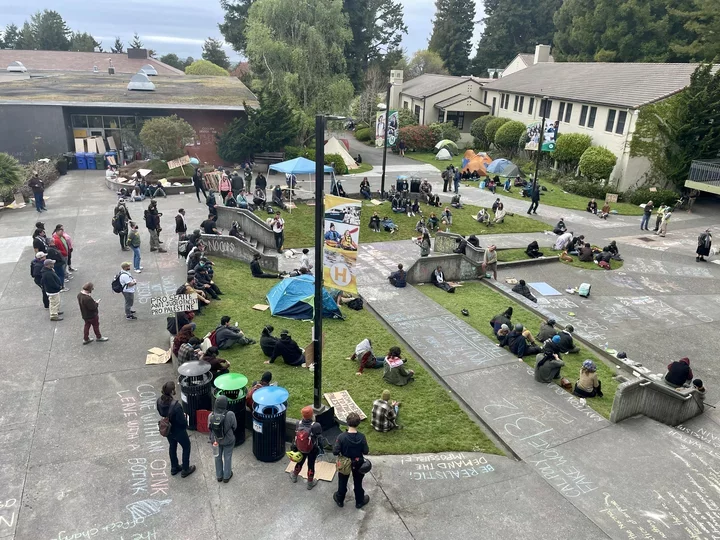Student protestors on the UC Quad on Monday, April 22. Image: Ryan Burns
###
The American Civil Liberties Union (ACLU) of Northern California and the First Amendment Coalition today sent a letter to Cal Poly Humboldt President Tom Jackson expressing concern about the university’s decision to impose a campus-wide closure in response to the recent pro-Palestine demonstration.
The letter – written by ACLU Senior Staff Attorney Chessie Thatcher and First Amendment Coalition Legal Director David Loy – questions the constitutionality of the ongoing “hard closure” and asserts that the university has an obligation to “maintain spaces on its campus that constitute a designated public forum,” such as the UC Quad.
“We believe that the university’s policy limiting public access — and especially press access — is constitutionally suspect,” the letter states. “We recognize that this closure has been asserted in response to the recent civil unrest and involvement of law enforcement at Cal Poly Humboldt, but it is precisely in these moments that reporting by a free press is essential. We urge you, in the strongest possible terms, to lift this campus-wide closure.”
The letter notes that the ongoing campus closure “does not appear to fall within its Campus Closure Policy,” which only applies when “an emergency or unplanned event occurs that threatens the safety of persons or property.”
“Whatever may have happened previously, it is difficult to see how any such emergency currently exists that could justify the complete closure of the entire campus, including its designated public forum spaces,” the letter continues. “That clean-up work might be more expedient without observation does not provide a basis to exclude observers. And the university is ‘not free to foreclose expressive activity in public areas on mere speculation about danger.’”
The letter also calls out the university’s “severe restrictions” on press access to campus. The new rules, imposed earlier this week, require members of the media to email in advance their “press credentials” or “authorization from your news outlet” to gain access to campus.
“California law does not require that a reporter be on assignment from a particular news organization to gain press access,” the letter states. “Nor does the law necessarily require reporters to provide identification or contact information for themselves or others.”
Read the letter in full here.

CLICK TO MANAGE